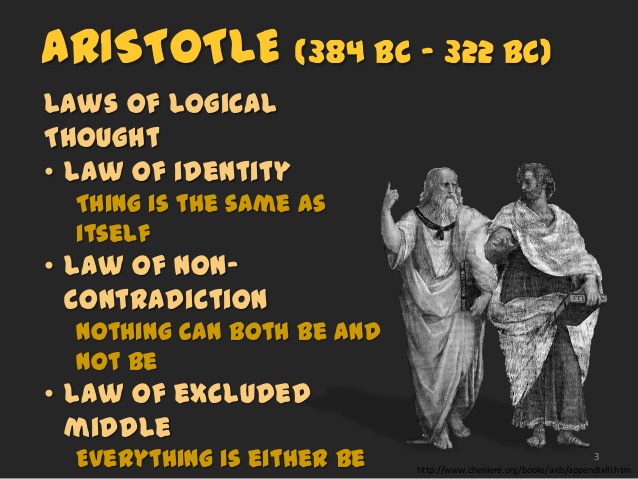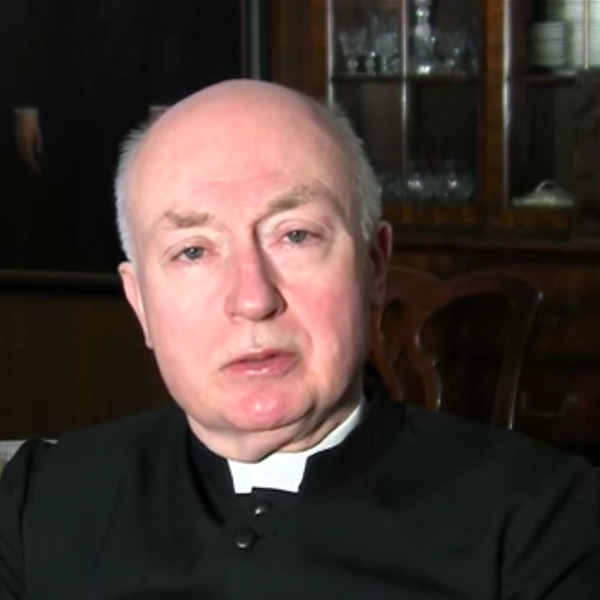Jesus answered, “I am the Way and the Truth and the Life. No one comes to the Father except through Me.” -Jn 14:6
“Dante’s thought was so greatly shaped by Aristotle that he called him “The Philosopher” rather as it is customary to call Saint Paul “The Apostle.” He placed Aristotle in a sort of suburb of Heaven, for Aristotle’s logical thought was a noble anticipation of Christ the Word, or Logos, as the litmus test for all logical thought. Aristotle applied his “Principle of Non-Contradiction” in several ways, but the third way, most pertinent to daily conversation, means that two statements that are opposite cannot both be true.
Like all great truths, this seems so obvious that it should hardly need to be pointed out. But people contradict the principle of non-contradiction all the time. It is easy to slip into this mistake out of fuzzy courtesy — which in the extreme is a form of sentimentality — as when someone says, “That may be true for you, but it is not true for me,” or, “All religions are the same.” Pope Benedict XVI saw this as so great a danger to logical living that he spoke of it as a “dictatorship of relativism.”
To propose that opposite assertions can be true is harshly to cancel out truth. In our grammar, two negatives make a positive, but to say that a negative and a positive make a positive would be to say that nothing is really positive. Then to say that Christ is and is not the Living Word is to say that the Word is just a word. This “dictatorship” inevitably tries to crush any assertion that there is such a thing as logic at all.
This is not a matter just for the philosophy class. It has harsh consequences for justice. The “show trials” of Stalin and Hitler were held in a Humpty Dumpty world where a word means anything the judge wants it to mean. This reduces sense to sentimentality, and there is a fine line between sentimentality and cruelty, because it twists logic and explains why demagogues speak of caring for society even as they destroy every vestige of it, condoning unnatural acts as natural, and even offering to help children by killing them, as “lawmakers” in Brussels have recently done. Milton said, “The mind is its own place and in itself can make a Heaven of Hell, a Hell of Heaven.”
Christ did not contradict Himself when He said that He fulfilled the Law, even while He was breaking some of the little laws. He was showing the logic of the law as expressive of the eternal Logos that orders all things. The Apostle, even wiser than The Philosopher, spoke of a wisdom which “is not of this age or of the rulers of this age, who are doomed to perish. But we speak God’s wisdom, secret and hidden, which God decreed before the ages for our glory. None of the rulers of this age understood this; for if they had, they would not have crucified the Lord of glory” (1 Corinthians 2:6-8).”

-by Karlo Broussard
“Doubting the principle of non-contradiction
There is one last counter a global relativist might employ: deny the principle of non-contradiction (PNC). Recall above that we said one of the reasons why global relativism is false is because it violates the PNC. To say global relativism describes the way the world really is amounts to saying, “It’s absolutely true that there is no absolute truth.”
But notice this critique assumes the truth of the PNC. So, if a global relativist is determined to save his position, he might deny the validity of the PNC.
There aren’t too many who would be so radical as to deny the PNC. But there are enough to justify a defense.
Defending a first principle
The PNC is a first principle of knowledge, which means its truth is not derived from the truth of any prior principles. Its truth inheres in the principle itself, and thus cannot be logically demonstrated—a way of showing that something is true by using a syllogism (e.g., All men are mortal; Socrates is a man; therefore, Socrates is mortal).
However, we can defend the PNC by showing how if you want to deny it, you necessarily have to use it. This is the chief mark of any first principle.
We can show this in three ways.
1. Intending the meaning of your denial
First, a PNC skeptic can speak against the PNC only if his words (“The PNC is false”) have their intended meaning and not their contradictory meaning (“The PNC is not false”).
For example, if a PNC skeptic says, “The PNC is false,” he must intend that statement to mean what it expresses and not the contradictory statement “The PNC is not false.” If a PNC skeptic affirmed the contradictory proposition—“The PNC is not false”— he would be affirming what he set out to deny, in which case his denial of the PNC would be self-defeating.
So, a PNC skeptic must intend to mean what his initial statement expresses (“The PNC is false”) and not its contradiction (“The PNC is not false”). But if he does that, he necessarily assumes that he can’t affirm at the same time both “The PNC is false” and “The PNC is not false.”
But for a PNC skeptic to think that he can’t affirm two contradictory statements at the same time is to presuppose the validity of the PNC, which again undermines his initial attempt to deny the principle.
So, a skeptic’s denial of the PNC ultimately ends in self-defeat since he can’t deny it without using it.
Perhaps a PNC skeptic could remain silent. Would that save a PNC skeptic from the above dilemma? The answer is no, for even understanding what is meant by the principle presupposes its truth. The cognitional content must have the intended meaning and not its contradictory.
2. Contradictory evidence
Another way to show how we can’t deny the PNC without using it is to point out that a PNC skeptic only attempts to deny the PNC because he thinks he found some evidence that contradicts it.
But if a PNC skeptic believes some evidence contradicts the PNC, then he necessarily assumes it’s impossible for the evidence to both contradict the PNC and not contradict the PNC at the same time. For if that were possible, then the evidence wouldn’t contradict the PNC, and thus our skeptic friend would have no reason to doubt the principle.
Now, to assume that it’s impossible for the evidence to both contradict and not contradict the PNC at the same time is to also assume that you can’t affirm at the same time two contradictory states of being. But, of course, these assumptions can be made only if the PNC is true.
Once again, it’s impossible for someone to deny the PNC without presupposing its truth.
3. To be or not to be
There is yet another (and more fundamental) way to defend the PNC against its deniers. Consider the fact that for a skeptic to deny the PNC, and intend for us to take him seriously, he must believe that he exists. If a PNC skeptic believed he didn’t exist, then we would have no reason to consider his denial of the PNC. That should be pretty clear!
If the PNC denier believes that he exists rather than that he does not exist, then he believes it’s impossible for him to both exist and not exist in the same respect at the same place and time. But someone can believe this only if they first believe that the PNC is true. Therefore, you can’t deny the PNC without using it.
Because the PNC is a first principle of knowledge, it belongs to the very fabric of the mind’s activity. It governs all rational thinking. As such, rational beings (human, angel, and even God himself) cannot escape it. Someone may be able to deny it verbally, but he cannot be mistaken about it in thought.
Since it’s logically impossible to deny the PNC, and global relativism violates the PNC, it follows that global relativism is false. And, as we said above, if global relativism is false, then it’s contradictory “that there is absolute truth” is true.
Love & truth,
Matthew


